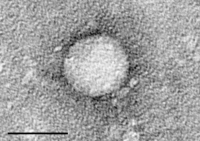
Photo from wikipedia
INTRODUCTION: Tumor mutation burden (TMB) is a commonly used biomarker for cancer immunotherapy however TMB only partially captures tumor foreignness. We hypothesized that mutations in single-copy regions of the genome… Click to show full abstract
INTRODUCTION: Tumor mutation burden (TMB) is a commonly used biomarker for cancer immunotherapy however TMB only partially captures tumor foreignness. We hypothesized that mutations in single-copy regions of the genome or mutations present in multiple copies (hereafter referred to as persistent mutations) are retained during cancer evolution and immunoediting, may render the tumor continuously visible to the immune system and promote sustained tumor control during immune checkpoint blockade (ICB). METHODS: We performed pan-cancer analyses of whole exome sequencing data across 31 tumor types in TCGA to quantify the landscape of persistent mutations (n=9,242). We then evaluated the association between persistent tumor mutation burden (pTMB) and ICB response compared to TMB in eight ICB-treated cohorts of patients with NSCLC, melanoma, mesothelioma, and head and neck cancer (n=524). To investigate the clonal evolution of persistent mutations we serially analyzed whole exome sequence data from NSCLCs prior to and at emergence of acquired resistance to ICB. Finally, we evaluated the composition of the tumor microenvironment (TME) in baseline and on-ICB melanomas by RNA sequencing differential enrichment analyses and deconvolution. RESULTS: Integration of sequence alterations in only-copy and multi-copy states for 9,242 tumors across 31 tumor types revealed a cancer lineage-dependent distribution of persistent mutations that was largely independent of the overall TMB. In evaluating differential classification based on pTMB- vs TMB-high, we found re-classification rates as high as 53% in individual tumor types, with a median reclassification rate of 33% across all tumor types (range 15% - 53%). We then evaluated the clonal composition of persistent mutations and found a wide range of correlations between pTMB and fraction of clonal mutations (Spearman ρ range: -0.11 - 0.59). In ICB-treated cohorts, pTMB better distinguished responding tumors compared to TMB, and a number of mutation and copy-number related features including tumor aneuploidy (melanoma: Mann-Whitney p=2.3e-06, NSLC: p<2.0e-03, mesothelioma p=0.03, HNSCC p=0.05). Using in silico simulations, we found a similar advantage for pTMB when estimated from gene-panel targeted next generation sequencing. To support the biological plausibility of pTMB in the context of tumor evolution, we evaluated the rate loss of persistent mutations in longitudinal analyses of pre- and post-ICB NSCLC and found that a rate of loss significantly lower for persistent compared to loss-prone mutations (odds ratio 61.43, p<2.2e-16). Consistent with our hypothesis, pTMB-high tumors had a more inflamed TME (p<1e-11). CONCLUSIONS: Persistent mutations represent a biologically distinct subset within the overall TMB that is unlikely to be lost under selective pressure of ICB and may function as an intrinsic driver of sustained immunologic tumor control. Citation Format: Noushin Niknafs, Archana Balan, Christopher Cherry, Karlijn Hummelink, Kim Monkhorst, Xiaoshan M. Shao, Zineb Belcaid, Kristen A. Marrone, Joseph Murray, Kellie N. Smith, Benjamin Levy, Josephine Feliciano, Christine L. Hann, Vincent Lam, Drew M. Pardoll, Rachel Karchin, Tanguy Y. Seiwert, Julie R. Brahmer, Patrick M. Forde, Victor E. Velculescu, Valsamo K. Anagnostou. Persistent mutation burden drives sustained anti-tumor immune responses in human cancers [abstract]. In: Proceedings of the American Association for Cancer Research Annual Meeting 2023; Part 1 (Regular and Invited Abstracts); 2023 Apr 14-19; Orlando, FL. Philadelphia (PA): AACR; Cancer Res 2023;83(7_Suppl):Abstract nr 1393.
Journal Title: Cancer Research
Year Published: 2023
Link to full text (if available)
Share on Social Media: Sign Up to like & get
recommendations!